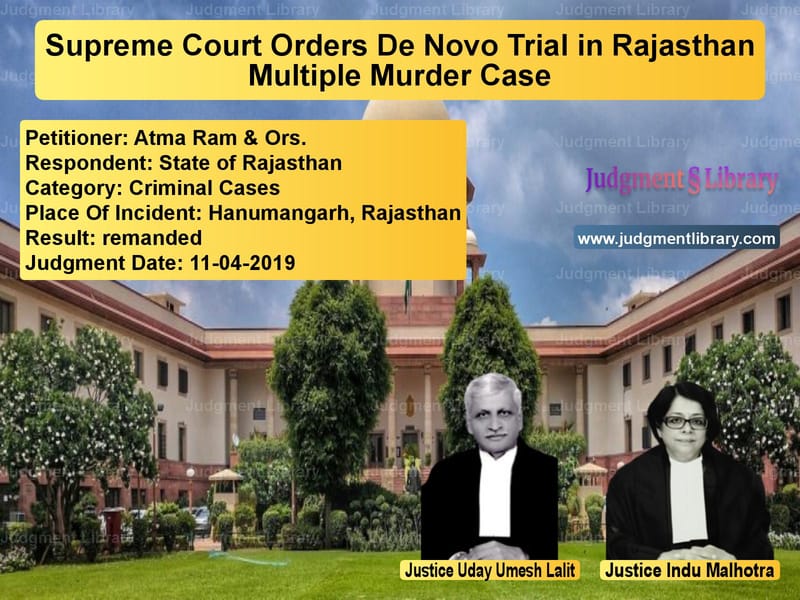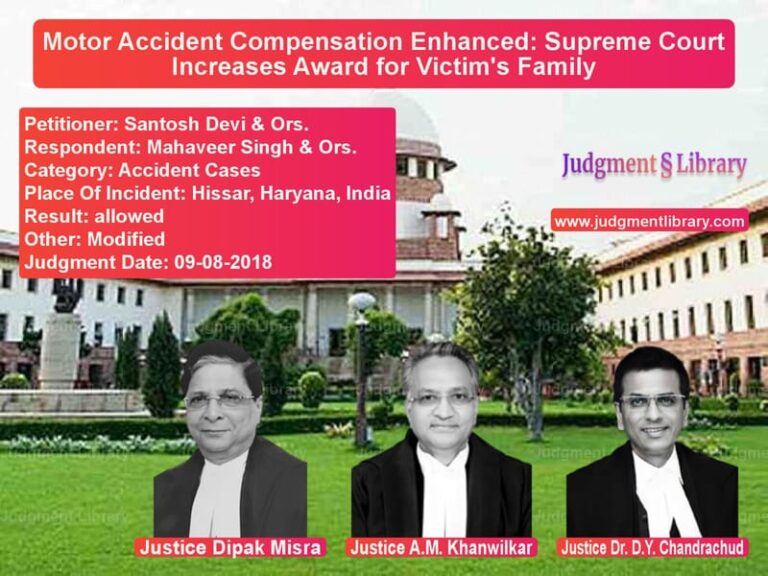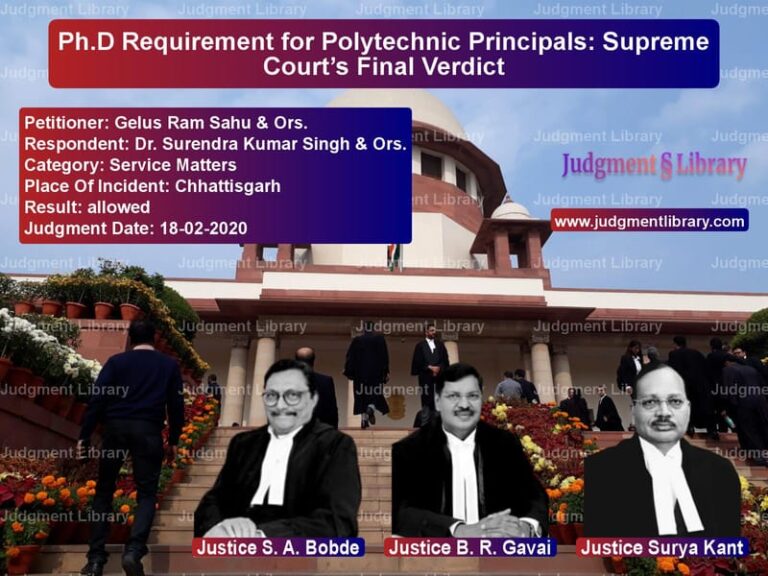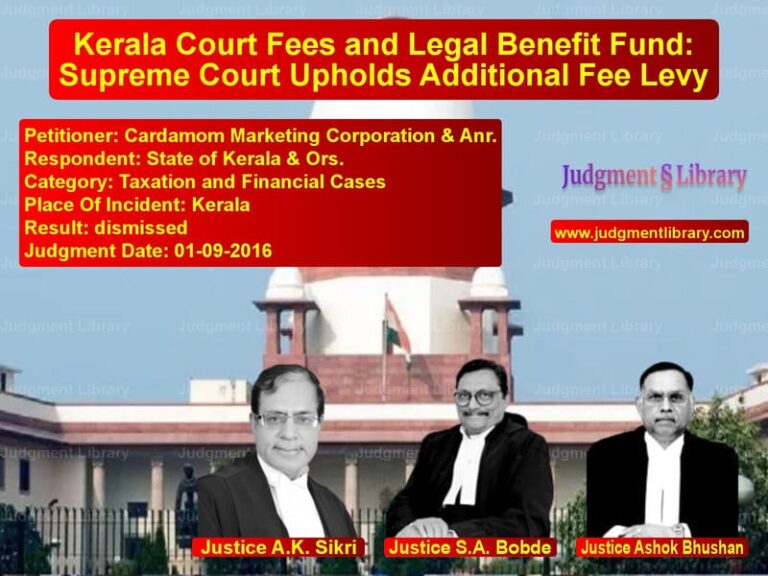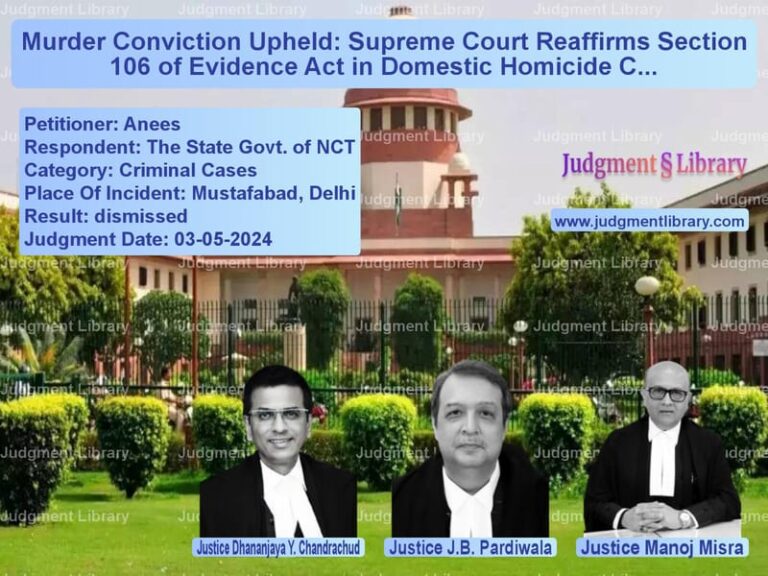Supreme Court Orders De Novo Trial in Rajasthan Multiple Murder Case
The Supreme Court of India, in the case of Atma Ram & Ors. v. State of Rajasthan, set aside the conviction and death sentence imposed by the trial court and directed a de novo trial. The judgment addressed procedural lapses in the conduct of the trial, particularly the violation of Section 273 of the Code of Criminal Procedure (CrPC), which mandates that evidence be recorded in the presence of the accused.
Background of the Case
The case stemmed from an FIR (No. 493) filed on October 13, 2013, at Bhadara Police Station, Hanumangarh, Rajasthan. The informant, Kailash, reported that a group of accused individuals, including Atma Ram, Om Prakash, Leeladhar, and Shravan Kumar, attacked his family while they were harvesting crops. The attack resulted in the deaths of his father, Bhanwarlal, and brother, Pankaj. Subsequently, the assailants proceeded to their village and killed his grandfather, Momanram. Kailash later succumbed to his injuries.
The police conducted an investigation and filed a charge sheet against the appellants. The trial was conducted in the Additional Sessions Court, Bhadara, Hanumangarh. However, during key witness depositions, the accused were not physically present in court, violating their right to be present during the trial.
Trial Court Judgment
The trial court, in its judgment dated November 3, 2017, convicted the accused under Sections 147, 148, 302, 307, 452, 447, and 323 read with Section 149 of the Indian Penal Code (IPC). The court imposed the death penalty, subject to confirmation by the High Court.
High Court Proceedings
The Rajasthan High Court, while hearing the death reference (D.B. Criminal Death Reference No. 2 of 2017) and the appeal filed by the accused (D.B. Criminal Appeal No. 33 of 2018), noted procedural irregularities:
- The statements of 12 prosecution witnesses were recorded in the absence of the accused.
- The accused had objected to this violation during the trial.
- No remedial action was taken by the trial court.
Based on these findings, the High Court ruled that the trial was vitiated. However, instead of acquitting the accused, it directed a de novo trial, instructing the trial court to re-record the statements of the 12 key witnesses.
Supreme Court’s Analysis
The Supreme Court, in its judgment delivered by Justices Uday Umesh Lalit and Indu Malhotra, examined the key issues raised by the appellants and respondents.
1. Violation of Section 273 CrPC
The Court reiterated that Section 273 CrPC requires all evidence to be recorded in the presence of the accused. The appellants argued that the violation was an incurable illegality, rendering the entire trial void. The Court agreed that the procedure was violated but examined whether the trial was wholly vitiated.
“The right of an accused to watch the prosecution witnesses deposing before a court is a valuable right. The recording of statements without ensuring their presence amounted to a serious procedural lapse.”
2. State’s Argument on Curable Irregularities
The State of Rajasthan, represented by Senior Advocate Dr. Manish Singhvi, contended:
- Despite the procedural lapse, the defense cross-examined the witnesses.
- The accused did not raise prejudice claims during trial arguments.
- The trial could be remedied by a re-trial rather than vitiation.
“Not every violation of Section 273 CrPC leads to an invalid trial. The High Court’s direction for a de novo trial sufficiently remedies the lapse.”
3. Amicus Curiae’s Opinion
The Court had appointed Senior Advocate Ranjit Kumar as Amicus Curiae, who argued:
- The violation of Section 273 CrPC should be rectified through a re-trial.
- Setting aside the conviction without a fresh trial would defeat the ends of justice.
- The High Court’s approach was balanced, ensuring fairness to both the accused and victims.
“The interests of justice require a fair trial, which means both the accused and the prosecution must be given an opportunity to present their case properly.”
Supreme Court’s Final Judgment
The Supreme Court upheld the High Court’s ruling, affirming the need for a de novo trial to rectify procedural lapses. The key points of the judgment were:
- The previous trial was legally flawed due to the absence of the accused during witness testimonies.
- Rather than declaring the trial null and void, the best remedy was to re-record the testimonies of the 12 witnesses.
- The trial court must proceed expeditiously and conclude the matter within four months.
“We see no reason to interfere with the order passed and the directions issued by the High Court in the present matter. The Trial Court shall conduct the proceedings on a day-to-day basis and decide the case afresh within four months.”
Key Takeaways
- Section 273 CrPC is Mandatory: The Supreme Court reaffirmed that recording witness statements in the presence of the accused is essential for a fair trial.
- De Novo Trial as a Remedy: Instead of acquitting the accused, the Court ordered a fresh trial, ensuring that the procedural defect did not lead to injustice.
- Fairness to Both Sides: The ruling balanced the rights of the accused and the victims, allowing for the re-examination of key prosecution witnesses.
- Expedited Proceedings: The trial court was instructed to complete the fresh trial within four months.
Conclusion
The Supreme Court’s judgment in Atma Ram & Ors. v. State of Rajasthan sets a significant precedent in Indian criminal law, reinforcing the importance of procedural fairness. By ordering a de novo trial instead of acquittal, the Court ensured that justice is served without technicalities obstructing the truth. The decision highlights the judiciary’s commitment to upholding the rights of the accused while also ensuring that victims and society receive justice.
Petitioner Name: Atma Ram & Ors..Respondent Name: State of Rajasthan.Judgment By: Justice Uday Umesh Lalit, Justice Indu Malhotra.Place Of Incident: Hanumangarh, Rajasthan.Judgment Date: 11-04-2019.
Don’t miss out on the full details! Download the complete judgment in PDF format below and gain valuable insights instantly!
Download Judgment: Atma Ram & Ors. vs State of Rajasthan Supreme Court of India Judgment Dated 11-04-2019.pdf
Direct Downlaod Judgment: Direct downlaod this Judgment
See all petitions in Murder Cases
See all petitions in Bail and Anticipatory Bail
See all petitions in Judgment by Uday Umesh Lalit
See all petitions in Judgment by Indu Malhotra
See all petitions in Remanded
See all petitions in supreme court of India judgments April 2019
See all petitions in 2019 judgments
See all posts in Criminal Cases Category
See all allowed petitions in Criminal Cases Category
See all Dismissed petitions in Criminal Cases Category
See all partially allowed petitions in Criminal Cases Category

